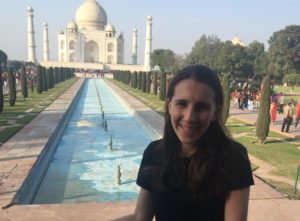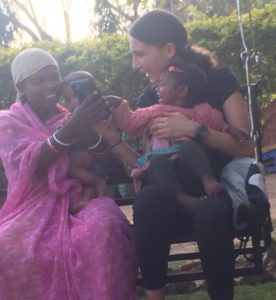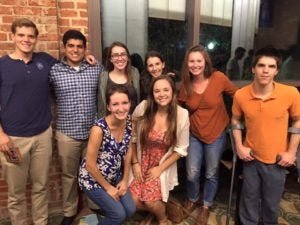Title: Senior Bessie Zavidow (SFS’18) Combines Theory and Policy in International Economics
 Bessie Zavidow
Bessie Zavidow
SFS, Class of 2018, International Economics
Bergen County, New Jersey
Language: Spanish, Chinese
Proseminar: The Rise of Global Capitalism with Professor Raj Desai
On-Campus Activities:
Mortara Undergraduate Research Fellowship
Teaching Assistant in the Economics Department
Chinese Language Exchange
Georgetown Running Club
Georgetown Journal of International Affairs
Non-GU Activities
Immigration Legal Services department of Catholic Charities USA (Interpreter)
Office of Innovation Research & Assessment of the non-profit organization Operation HOPE (Intern)
During her very first semester at Georgetown, Bessie Zavidow (SFS’18) took what ended up being one of her favorite classes: The Rise of Global Capitalism with Professor Raj Desai. That proseminar, along with her required first-year economics courses, helped instill in her a passion for economics.
“I discovered that I really enjoy the analytical way in which economists make sense of the world,” Zavidow says.
Zavidow, who graduated early in December 2017, was an International Economics (IECO) major in the School of Foreign Service. Within this major, she focused on the subfield of Theory and Policy, which allowed her to deepen her understanding of economic theory through math and statistics classes. The subfield also required her to take several courses concerning the application of economic theory.
“I was able to see how the theory in my previous courses was used in practice across a wide range of fields of economics, such as development economics, industrial organization, and market design,” Zavidow says.
Zavidow’s proseminar not only pointed her to her eventual major, but also provided her with a valuable mentor in Professor Desai. After taking his proseminar, she worked as a research assistant for him through the Mortara Undergraduate Research Fellows program for the rest of her time at Georgetown.
“I have learned so much from him: how to become a better writer and a more critical reader, how to present my work clearly and concisely, how to develop specific research interests, and so much more,” Zavidow says. “I am incredibly grateful for his generosity with his knowledge, kindness, patience, and mentorship throughout my time at Georgetown.”

Conducting Research in India
After graduating, Zavidow went to India to research first-hand the development issues she had spent three years studying with Professor Desai. She lived in Udaipur, Rajasthan, India for two months conducting research with Seva Mandir, a grassroots organization that works with over 700 villages in southern Rajasthan.
“The research I worked on focused on evaluating the effects of a program to train local women to become birth attendants on maternal health and maternal mortality outcomes,” Zavidow explains. “I also designed surveys to be used in an project sponsored by Colgate that supports agricultural activities to provide supplemental income to local villagers.”
One Georgetown class that significantly contributed to Zavidow’s work was Development Economics with Professor Garance Genicot, which exposed her to much of the current literature on development issues ranging from education to household and family economics. She found this information particularly helpful during her time in India, especially when looking at issues like women’s health and maternal mortality.
“These were issues that I had not worked on previously during my time as a research assistant, so I found myself referring to my notes from Development Economics when we discussed papers on maternal mortality in developing countries,” Zavidow says.
Combining Theory and Policy
Zavidow also enjoyed Industrial Organization and Topics in Competition and Regulation with Professor Marius Schwartz, which she took back-to-back during her junior year.

“They related to each other so well, that it felt like one, year-long course,” Zavidow says.
In these classes, Zavidow learned about the economic theory behind how firms behave and interact, along with antitrust policy. She also participated in a mock trial of antitrust cases, and Professor Schwartz even brought in attorneys and economists who worked on the actual cases to judge them.
“These classes really tied together the ‘Theory’ and ‘Policy’ parts of the subfield of my major,” Zavidow says.
Outside of class and her research fellowship, Zavidow was a teaching assistant in the economics department and participated in the Chinese Language Exchange, along with the Georgetown Journal of International Affairs. She was also part of the Georgetown Running Club, which gave her many opportunities to break the “Georgetown bubble.”
“While I know there is much of DC that I have yet to get to know, I think that going on runs has allowed me to explore so many different neighborhoods and trails to which I would have not otherwise have gone,” she says.
She also spent time off-campus volunteering as an interpreter in the Immigration Legal Services department of Catholic Charities USA, where she helped facilitate communication between attorneys and immigrants for services including naturalization, status adjustment, and court representation. Additionally, she interned in the Office of Innovation Research & Assessment of the non-profit organization Operation HOPE, where she analyzed the impact of their financial literacy programs on underserved youth in the D.C. metropolitan area.
Looking Ahead
Since returning from India, Zavidow has recently started working at an economic consulting firm in D.C. Having already had a few months to reflect on her experience at Georgetown, she has started to realize what she will really miss the most.
“I will miss being surrounded by so many intelligent, hardworking, passionate, and driven individuals,” Zavidow says. “When I talk to my friends and classmates, I learn so much and walk away from the conversation impressed and excited to learn more.”
Besides her classmates, Zavidow will also miss having constant access to professors who are experts in their fields.
“Whenever I had a question, my advisor or professors were always able to point me in the direction of a resource or another individual to help me find an answer to it,” Zavidow says.
While Zavidow is not sure of her future goals just yet, she plans to continue studying issues of local, community-driven development in a data-driven way. Regardless of where her interests take her, she knows that her time at Georgetown has prepared her well.
“My economics classes have equipped me with some of the existing theory, my research experiences have taught me about some of the actual problems that exist and the challenges with implementing solutions, and my statistics classes have provided technical skills,” Zavidow says. “I deeply believe that my experiences as an undergraduate at Georgetown and at the SFS have prepared me for what is to come.”